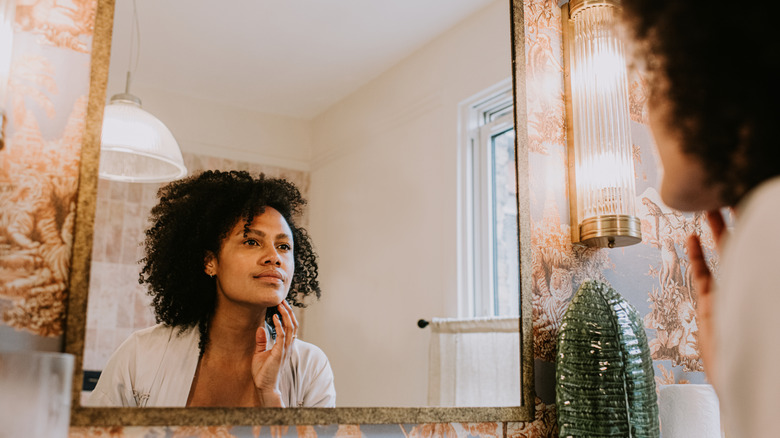The Wellness Trends That Will Be Unavoidable In 2025
Wellness as both a lifestyle practice and a consumer industry has only grown in popularity in the last decade, with Millennials and Gen-Z having a noted interest in the topic. What wellness looks like can vary on an individual level, ranging from regular journaling and expert-promoted gratitude practices to regimented diets and consistent exercise routines. Even so, the wellness sector still has its fair share of trends, with the year 2024 seeing a surge of slow-aging practices and the rise of badminton as the new It-Girl sport.
In this way, industry experts spoke exclusively to Women to dish on which wellness trends would dominate the new year. Loren Hogue, Co-CEO and 10 Year Master Somatics Coach at NEUROFIT, weighed in on what we can expect from 2025, while Dr. Erin Barrett, Director of Product Innovation And Scientific Affairs at Shaklee Corporation, provided expert insight on consumer priorities. Additionally, Sylwia Wiesenberg, founder of the wellness brand BAWDY, shed some light on the intersection of wellness and beauty in the year to come.
Personalizing wellness through technology
Using data and technology to personalize wellness routines is predicted to be a major trend of 2025, with experts citing the continual rise of health-tracking wearables and the expanding sector of AI technology as influencing factors. If you're unfamiliar, wearables refer to devices designed to track bodily functions like sleep time, heart rate, and steps. They often come in the form of watches or rings.
According to a consumer report published by Euromonitor, younger generations are continually adopting such technology, with 33% of Millennials and 27% of Gen-Z consumers reportedly sporting wearables in 2024 (per Vogue Business). "The future of wellness is personalized and evidence-based because everyone's body is unique," Loren Hogue, Somatics Coach and Co-CEO of NEUROFIT, shared with us. "Modern tech is making it possible to pinpoint these patterns and get personalized recommendations that actually work for your specific body and nervous system type."
Utilizing functional nutrition
The focus on personalized wellness is projected to impact the food and diet industry, with experts emphasizing the rise of functional nutrition. This holistic approach to food intake considers a food's nutritional value in conjunction to an individual's lifestyle habits and health situation. For example, a person who suffers from a chronic illness would avoid foods that worsen their symptoms, even if that food is generally promoted as a healthy and nutritious option.
"It takes a personalized approach to nutrition and its impact on optimizing health," Dr. Erin Barrett, Director of Product Innovation And Scientific Affairs at Shaklee Corporation, explained. "It acknowledges that each of us is unique, made up of individual physiology, genetics, and lifestyle factors." While regimented diets like keto, Mediterranean, and carnivore will likely remain popular, functional nutrition practices are set to become more relevant than ever in the new year.
Focusing on healthy aging and longevity
The rise of personalized wellness goes hand-in-hand with the increased focus on longevity-based health practices. The last four years already saw a major shift towards slow-aging products and techniques, with experts asserting that the trend will continue into 2025. While anti-aging has largely been associated with skincare and beauty products, personalized technology allows individuals to take a more hands-on approach to their personal health with longevity in mind.
"Anti aging is no longer solely about appearance," Dr. Erin Barrett of Shaklee Corporation exclusively tells Women. "Longevity is set to dominate the wellness sector in 2025, according to Euromonitor International's 'Top Global Consumer Trends 2025' report. The data analytics firm's survey of more than 40,000 consumers showed people are making intentional changes within their wellness routines for the betterment of their future selves, with the goal to live healthier for longer."
Integrating wellness and beauty
The expansion of anti-aging into longevity-based health practices actually speaks to the growing overlap of wellness and beauty, a trend that is set to grow in the new year. "2025 will further reinforce that wellness and beauty cannot live without each other," Sylwia Wiesenberg, wellness influence and BAWDY founder, explained. "The focus will be on further integration of fitness, supplements, spa treatments, cold plunges and saunas, professional laser treatments, meditation and meditation in motion, food and less drinking."
In other words, while beauty is traditionally associated with cosmetics and skincare, individuals have become more holistic in their approach, intentionally implementing wellness practices that positively impact both health and appearance. Experts predict that this will also manifest in more science-driven products in 2025, with consumers being more critical of clean beauty claims. "The shift from clean beauty towards beauty brands that are scientifically backed doesn't mean that consumers are not interested in clean brands," Wiesenberg continued. "They are just not sold solely on 'clean beauty' and 'sustainability' marketing claims."
Embracing community-based wellness
Community-based wellness is similarly situated to be popular in 2025, with this trend signifying the increasingly recognized importance of social interaction within the wellness sphere. This approach to health and fitness can range from taking a class at the rec center or gym to organizing regular hikes with friends. The Every Girl reported a notable increase in Yelp searches for social and fitness-related activities like running groups and padel tennis.
"People are finding that sharing a common language around well-being with others–-whether that's discussing nervous system states or supporting each other's wellness goals-–creates powerful support systems that help them with both progress and togetherness," Somatics Coach and Co-CEO of NEUROFIT Loren Hogue told us. While community-based wellness is by no means new, it's predicted to only grow in relevance in the upcoming year.
Implementing digital boundaries
The implementation of digital boundaries is a projected trend that relates to the shift towards in-person, social interactions. As technology becomes an increasingly integral part of our everyday lives, individuals are being more conscious and intentional with their screen-time to promote both digital and overall wellness. "There's a growing movement toward what I call 'intentional disconnection,'" Loren Hogue of NEUROFIT told us. "We're seeing more people set clearer boundaries with technology, not by completely disconnecting like some celebrities have done, but by creating structured breaks and using tech mindfully."
Excessive screen time has been associated with negative outcomes ranging from decreased physical activity and lowered workplace performance to sleep problems and anxiety. Digital boundaries are used to combat these issues, with individuals monitoring their screen time, turning off notifications, and allotting tech-free time periods. "Our community data shows that people who manage their digital stress report 22% better emotional balance," Hogue explained.
Understanding the importance of sleep
Quality sleep is predicted to be another driving factor of wellness in 2025, with individuals continually looking for ways to improve their overnight rest. This year already saw the rise of sleepmaxxing, a viral social media trend where users shared their favorite tips and products for getting a good night's sleep. While some of the boasted items and strategies have been criticized or warned against by experts, such as the risky mouth-tapping technique, this focus on sleep represents a major concern within the wellness and health sphere.
"People are increasingly recognizing how essential sleep is for overall health and well-being," Raj Dasgupta, MD, board certified physician of sleep medicine and chief medical Advisor for Sleepopolis, told Healthline. "By prioritizing sleep, more people are making choices that allow them better rest. This change is especially important today in our fast-paced lives, where self-care and balance are important for staying healthy." In this way, we wouldn't be surprised to see a greater amount of sleep-related products on the market, but sleep tourism, which sees travelers visiting luxury hotels or wellness centers in pursuit of quality rest, is projected to be especially popular in the new year.







